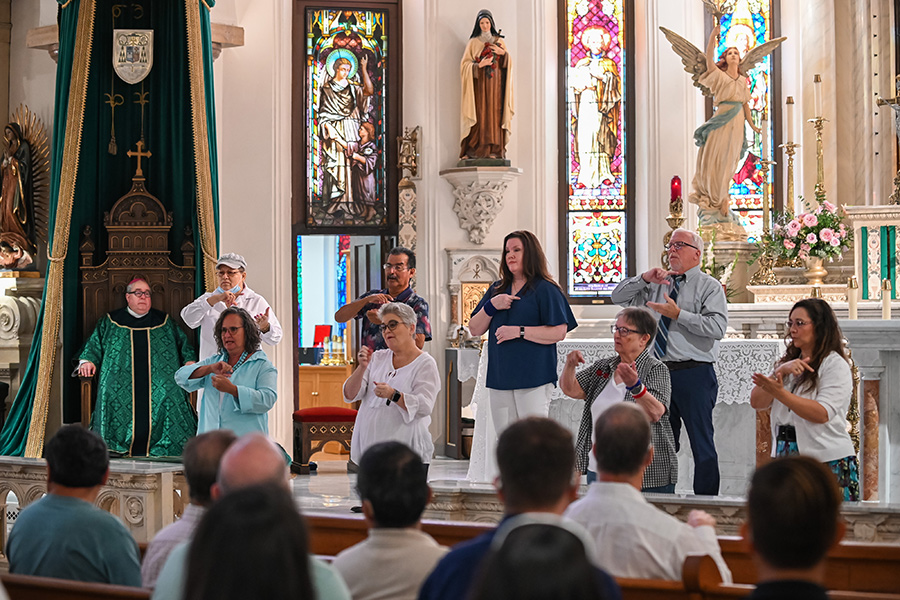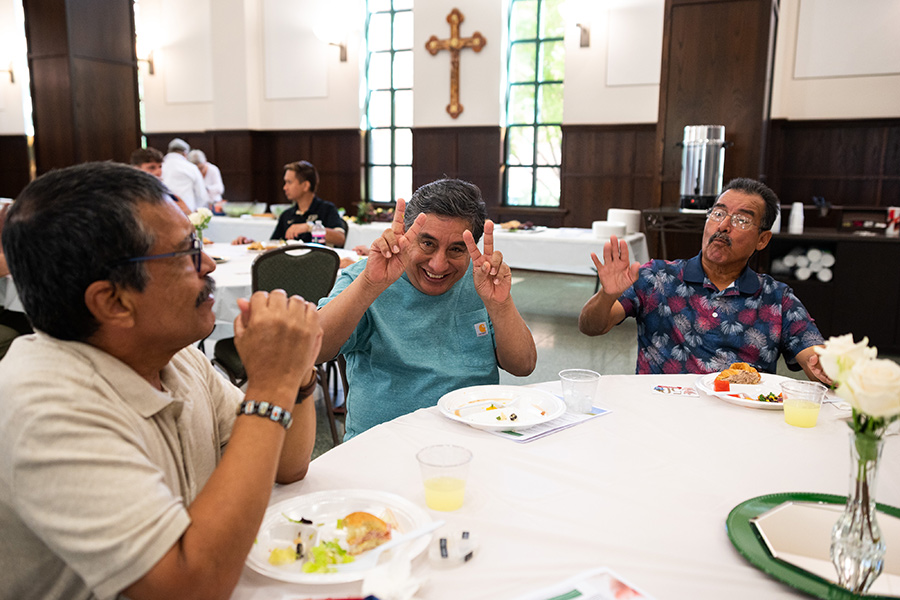Seen, heard, and celebrated: Deaf Ministry observes 50 years of outreach, inclusion

The Deaf Ministry choir signs a song during a special 50th Anniversary Mass on Oct. 02, 2022 at St. Patrick Cathedral. (NTC/Ben Torres).
Photo gallery of the 50th anniversary Mass
Several area Catholics lined the front of the altar toward the conclusion of an Oct. 2 Mass at St. Patrick Cathedral to sign the closing hymn, delivering at once a grand finale of sorts and a celebration of fellowship.
The Mass, concelebrated by Bishop Michael Olson and Father Ken Robinson, marked the 50th anniversary of the founding of the diocese’s Deaf Ministry, which serves deaf and hard-of-hearing Catholics as well as their family members.
Through five decades, Bishop Olson noted in his homily, Deaf Ministry has helped uproot complacency, isolation, and indifference throughout the diocese both for hearing and hearing-impaired faithful.
“Deaf ministry has enabled both with the capacity to listen to God as He speaks to us through His word and then together to put the gift of faith into action through conversion and service,” Bishop Olson said.
Bishop Olson commended those served by, as well as those serving the ministry, and called upon both to continue doing their part.
“The Lord has called us, and He expects us to share the gifts He gives us,” Bishop Olson said. “He expects us to find ways to bring His love to the world.”
Such is synonymous with the ministry’s aims, said Connie Martin, diocesan coordinator for Deaf Ministry.
“It brings community in a different way,” Martin said. “The religious aspect is that it opens doors to build relationships between the hearing and the hearing impaired. It’s a great example of ‘we can do this together,’ and it brings out inclusion.”
The ministry, among other services, offers five interpretive Masses each week, two in Fort Worth and one each in Arlington, Grapevine, and Wichita Falls, Martin said.
A Deaf Community Mass is also celebrated the first Sunday of each month at St. Rita Church in Fort Worth. Deaf parishioners participate as cantors, lectors, ushers, and extraordinary ministers of the Eucharist.
“We want to get people involved, draw them into participation,” Martin said.
“It’s in sign language but also spoken,” Martin said. “Because many deaf people, about 90 percent of them, have hearing family members. That way the family can worship together instead of going to different parishes.”
Fr. Robinson signs the Mass and Martin interprets his homily.
“We have a social after the Mass,” Martin said. “I think that’s another draw. Not only is Mass in sign language great, but there is socialization time too since many of the attendees don’t otherwise get to see their friends.”

Of the estimated 4 million deaf or hard-of-hearing people in the U.S., about 10 percent reside in Texas. How many live in the diocese is hard to say, Martin added.
“I send a newsletter out to about 90 families,” Martin said. “Of that maybe one or two people will be deaf in the family.”
Fr. Robinson agreed that local numbers are difficult to gauge.
“Many deaf Catholics come to Mass but [not always] to our deaf community Mass,” Fr. Robinson said.
“They may not know how to sign or may simply want to fit into their parish. But the reality is, if you look around, you’ll see them in every single one of our parishes.”
Martin moved to Fort Worth from Chicago in 1990 and became involved with the ministry in 1992.
“I’m Catholic,” Martin said. “I was in school for being an interpreter, heard that the diocese needed help, and volunteered.”
Fr. Robinson became involved in 1994 after a priest who had offered Masses with an interpreter retired.
“I agreed to celebrate Mass but not necessarily sign,” Fr. Robinson said. “But over time it just became easier to learn to sign, which is something you never stop learning.”
Fr. Robinson characterized his experience as a blessing.
“I get an opportunity to celebrate with a group who’s sort of in the woodwork,” Fr. Robinson said. “With deaf people or all special ministries, it’s important to get some PR occasionally so that the members of those ministries are known about and don’t just disappear into the woodwork.”
Martin said the Knights of Columbus have played a huge role: establishing Deaf Ministry in 1972 and funding it entirely until the mid-1990s, when Deaf Ministry became a diocesan program. The Knights still provide significant financial support for deaf ministry annually, and they join the community for social events periodically.
Knight Carlos Ortiz, of St. Mary the Virgin Council, was on hand Oct. 2 to assist with the social following the Mass.
“It makes me feel good and strengthens my faith to see that even with hardships, these people still believe in God and practice their faith,” Ortiz said, adding that he organizes bowling events for the deaf community and the Knights.
Jenny Thompson, an interpreter for the ministry, said she became involved about 30 years ago.
“Being part of the ministry has definitely helped feed and grow my faith,” Thompson said.
From retreats to friendships formed, parishioner David Cassanova, who has been deaf all his life, credited the ministry with helping his faith and day-to-day life.
“I’m a retired engineer but did teach some hearing people at work how to communicate better with deaf people and interact and exchange ideas,” Cassanova said.
Parishioner Emily Sainer spoke of the ministry’s role in her catechesis and socialization. Her mother, Julie Sainer, benefited as well.
“Deaf Ministry was pretty much my first interaction with deaf people besides my daughter,” Julie Sainer said.
Which, Thompson said, plays into the ministry’s inclusion aspect both in encouraging deaf and hard-of-hearing parishioners to branch out and to foster relationships and understanding among non-hearing-impaired parishioners.
“One big misconception is that deaf people can’t do something,” Thompson said. “That they don’t understand or don’t get it. They may need a little facilitating, but they get it. They just can’t hear.”
Martin agreed.
“We don’t look at it as a disability,” Martin said. “It’s an inability to hear. But deaf people can do anything and are very proud. They’re just, ‘My ears don’t work. So what?’”
